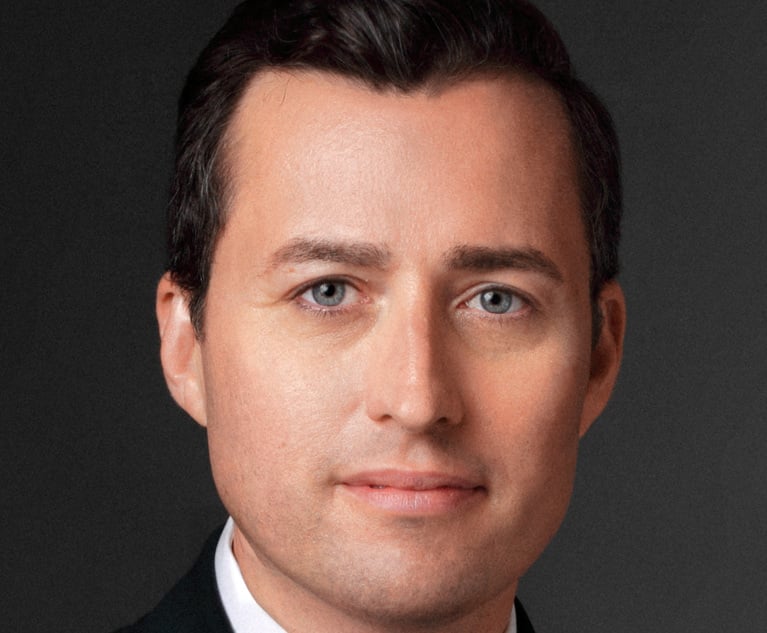Legal Finance: A Critical Tool for Policyholders and Their Lawyers
For both policyholders and their lawyers, legal finance can make it easier and less risky to pursue recoveries on valid insurance claims.
October 11, 2019 at 02:40 PM
6 minute read
 Insurance coverage disputes present a unique challenge for companies facing large first- or-third-party losses. The challenge was well captured 25 years ago by the California Court of Appeal, in the course of its many encounters with the decades-long saga of Montrose Chemical, at one time the world's largest manufacturer of the pesticide DDT, with the court noting the "prejudice [that] occurs when the insured is compelled to fight a two-front war, doing battle with the plaintiffs in the third-party litigation while at the same time devoting its money and its human resources to litigating coverage issues with its carriers."
Insurance coverage disputes present a unique challenge for companies facing large first- or-third-party losses. The challenge was well captured 25 years ago by the California Court of Appeal, in the course of its many encounters with the decades-long saga of Montrose Chemical, at one time the world's largest manufacturer of the pesticide DDT, with the court noting the "prejudice [that] occurs when the insured is compelled to fight a two-front war, doing battle with the plaintiffs in the third-party litigation while at the same time devoting its money and its human resources to litigating coverage issues with its carriers."
Policyholders facing that two-front war must often make difficult choices: Whether to contest coverage rather than risk scarce cash, and if so, whether to engage trusted longtime or highly expert counsel at their hourly billing rates or switch to unfamiliar or less specialized contingent-fee attorneys. Moreover, they face these choices in an inherently asymmetrical environment. For policyholders, suing an insurer is usually a one-time event, and the cost of coverage litigation is unplanned. Insurers, in contrast, budget for such efforts and are incentivized to litigate novel coverage issues to create favorable precedent—even if doing so makes no economic sense in the particular matter.
Despite the daily recurrence of this two-front war, many risk managers and their coverage counsel overlook a relatively recent addition to their list of tools to fight the battle successfully: legal finance. According to the 2018 Litigation Finance Survey, although most lawyers say they are aware of legal finance, only a minority have actually used it. The research also suggests that with further education in the subject, law firms and legal departments will increasingly leverage legal finance to pursue recoveries—over two-thirds of respondents who have not yet used legal finance expect do so in the next two years. A more recent study reinforces this notion: According to the 2019 Managing Legal Risk Report, nine out of 10 CFOs and senior finance professionals also expect that their companies will use legal finance in the next two years.
The reason for the bullishness is simple: Legal finance offers policyholders and their law firms a way to address the asymmetries inherent in insurance coverage disputes. When a company has suffered a loss or faces a liability, the possibility of then losing what could be a lengthy and protracted legal battle over coverage may be unsettling. By using legal finance to share or shift that, the policyholder creates a path to realizing on its coverage claim without the drain on current cash and the risk of seeing no return on that outlay.
In the case of companies dealing with major business interruptions or third-party liability claims—who may be unable to divert resources to the associated coverage dispute—legal finance may be necessary to move forward with the coverage claim at all. This is especially true for policyholders whose insurance claim may be their only source of near-term liquidity, as legal finance is an essential instrument to avoid taking a low or premature settlement. Additionally, by providing immediate liquidity, legal finance offers policyholders a potentially enterprise-saving solution in the aftermath of a catastrophic loss or in the face of a large liability exposure. Legal finance is a potentially critical element in the corporate disaster-preparedness toolbox—one that, like the other tools, risk managers and lawyers need to understand before a catastrophe is at hand.
In addition to affording significant risk-shifting or risk-sharing opportunities, legal finance can provide important accounting advantages to the insured company. Self-funded coverage litigation of course presents a risk of ultimately losing the company's investment in prosecuting its claim—but meanwhile, litigation fees and costs are not capitalized; rather, they are accounted for as current expenses that reduce the firm's earnings. Financing those litigation expenses on a non-recourse basis, in contrast, means that the policyholder (1) is never at risk of losing them, and (2) may suffer no reduction in earnings pending resolution of the claim. The policyholder pays the fees only upon a successful resolution, out of the proceeds of the claim, and the recovery in excess of those fees and the financing premium drops to the company's bottom line as profit. Meanwhile, the company has had the use of the funds it would have paid to prosecute its coverage claim.
Policyholder lawyers likewise can benefit from third-party financing. Besides being a risk-sharing and cash-flow enhancement device for firms operating under non-hourly billing arrangements, legal finance is also a powerful business development tool that helps law firms offer their clients better solutions faster—regardless of the firm's billing model. Obtaining financing of single cases or multi-case portfolios enables law firms to approach clients with financing solutions already in place, avoiding sometimes awkward and time-consuming negotiations for a compromise of client and lawyer goals for the engagement. Hourly-billing firms benefit from being able to offer the alternatives that financing provides: As one well-known contingent fee lawyer recently observed, "[l]itigation funders, insofar as I'm concerned, have facilitated my competition, which of course I'm not happy about. But the fact of the matter is now the big firms can compete with me because they have a litigation funder who is willing to pay 50 percent of their hourly fees." Contingent-fee firms also benefit from legal finance by sharing their risk, smoothing their cash flow and obtaining the tax advantages of financing their out-of-pocket costs, rather than paying them, without benefit of tax deductions, out of after-tax cash.
Although coverage disputes for large losses and liabilities often favor proceeding with litigation, policyholders sometimes find the high cost of pursuing such cases untenable in the short term, and choose to forgo suing on sound claims—recovering nothing, or settling for a fraction of the claim's worth. That needn't be the case. For both policyholders and their lawyers, legal finance can make it easier and less risky to pursue recoveries on valid insurance claims.
Andy Lundberg is a managing director of Burford Capital and a member of its investment committee. He previously practiced at Latham & Watkins in Los Angeles, where he served as global chair of the firm's insurance recovery practice. Connor Murphy is a director at Burford, focused on originating new business with law firms and corporate legal departments.
This content has been archived. It is available through our partners, LexisNexis® and Bloomberg Law.
To view this content, please continue to their sites.
Not a Lexis Subscriber?
Subscribe Now
Not a Bloomberg Law Subscriber?
Subscribe Now
NOT FOR REPRINT
© 2024 ALM Global, LLC, All Rights Reserved. Request academic re-use from www.copyright.com. All other uses, submit a request to [email protected]. For more information visit Asset & Logo Licensing.
You Might Like
View All
Insurance Company Sues Over 180 Health Care Providers for Fraud Under RICO
3 minute read
New York Court of Appeals Tightens Pleading Standards Against Insurance Policyholder
7 minute read
Amid Growing Litigation Volume, Don't Expect UnitedHealthcare to Change Its Stripes After CEO's Killing
6 minute read
GE Agrees to $362.5M Deal to End Shareholder Claims Over Power, Insurance Risks
2 minute readTrending Stories
- 1Senate Confirms Last 2 of Biden's California Judicial Nominees
- 2Morrison & Foerster Doles Out Year-End and Special Bonuses, Raises Base Compensation for Associates
- 3Tom Girardi to Surrender to Federal Authorities on Jan. 7
- 4Husch Blackwell, Foley Among Law Firms Opening Southeast Offices This Year
- 5In Lawsuit, Ex-Google Employee Says Company’s Layoffs Targeted Parents and Others on Leave
Who Got The Work
Michael G. Bongiorno, Andrew Scott Dulberg and Elizabeth E. Driscoll from Wilmer Cutler Pickering Hale and Dorr have stepped in to represent Symbotic Inc., an A.I.-enabled technology platform that focuses on increasing supply chain efficiency, and other defendants in a pending shareholder derivative lawsuit. The case, filed Oct. 2 in Massachusetts District Court by the Brown Law Firm on behalf of Stephen Austen, accuses certain officers and directors of misleading investors in regard to Symbotic's potential for margin growth by failing to disclose that the company was not equipped to timely deploy its systems or manage expenses through project delays. The case, assigned to U.S. District Judge Nathaniel M. Gorton, is 1:24-cv-12522, Austen v. Cohen et al.
Who Got The Work
Edmund Polubinski and Marie Killmond of Davis Polk & Wardwell have entered appearances for data platform software development company MongoDB and other defendants in a pending shareholder derivative lawsuit. The action, filed Oct. 7 in New York Southern District Court by the Brown Law Firm, accuses the company's directors and/or officers of falsely expressing confidence in the company’s restructuring of its sales incentive plan and downplaying the severity of decreases in its upfront commitments. The case is 1:24-cv-07594, Roy v. Ittycheria et al.
Who Got The Work
Amy O. Bruchs and Kurt F. Ellison of Michael Best & Friedrich have entered appearances for Epic Systems Corp. in a pending employment discrimination lawsuit. The suit was filed Sept. 7 in Wisconsin Western District Court by Levine Eisberner LLC and Siri & Glimstad on behalf of a project manager who claims that he was wrongfully terminated after applying for a religious exemption to the defendant's COVID-19 vaccine mandate. The case, assigned to U.S. Magistrate Judge Anita Marie Boor, is 3:24-cv-00630, Secker, Nathan v. Epic Systems Corporation.
Who Got The Work
David X. Sullivan, Thomas J. Finn and Gregory A. Hall from McCarter & English have entered appearances for Sunrun Installation Services in a pending civil rights lawsuit. The complaint was filed Sept. 4 in Connecticut District Court by attorney Robert M. Berke on behalf of former employee George Edward Steins, who was arrested and charged with employing an unregistered home improvement salesperson. The complaint alleges that had Sunrun informed the Connecticut Department of Consumer Protection that the plaintiff's employment had ended in 2017 and that he no longer held Sunrun's home improvement contractor license, he would not have been hit with charges, which were dismissed in May 2024. The case, assigned to U.S. District Judge Jeffrey A. Meyer, is 3:24-cv-01423, Steins v. Sunrun, Inc. et al.
Who Got The Work
Greenberg Traurig shareholder Joshua L. Raskin has entered an appearance for boohoo.com UK Ltd. in a pending patent infringement lawsuit. The suit, filed Sept. 3 in Texas Eastern District Court by Rozier Hardt McDonough on behalf of Alto Dynamics, asserts five patents related to an online shopping platform. The case, assigned to U.S. District Judge Rodney Gilstrap, is 2:24-cv-00719, Alto Dynamics, LLC v. boohoo.com UK Limited.
Featured Firms
Law Offices of Gary Martin Hays & Associates, P.C.
(470) 294-1674
Law Offices of Mark E. Salomone
(857) 444-6468
Smith & Hassler
(713) 739-1250






